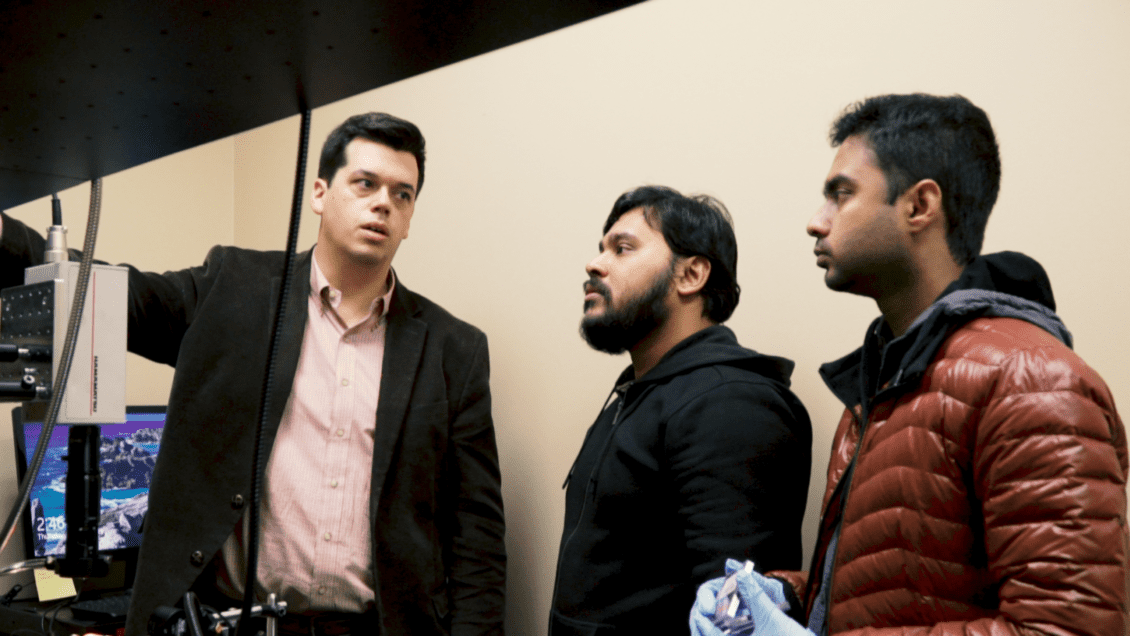The tiny devices that have already revolutionized how people send data over the internet, whether it’s an Instagram post or an email, could become even smaller and more efficient with help of research led by Clemson University’s Judson Ryckman.
Ryckman, an assistant professor of electrical engineering, is working to create smaller and more efficient photonic devices with the help of $450,000 from the Air Force Office of Scientific Research Young Investigator Program.

Just as electronics can be used to perform tasks with electricity, photonic devices can do the same with light, except faster. Most computer users never see photonic devices, but they are a crucial part of the internet’s infrastructure, sending data around the world literally at the speed of light.
Ryckman’s success could mean that movies download faster than they do now, but that’s just the start. Photonic devices could lead to improvements in a broad range of industries and products, he said.
Self-driving cars could be better equipped to navigate city streets, Ryckman said. And the Air Force could use photonic devices to improve communication underwater or in space, or for 3D sensing on the battlefield, he said.
The trouble is that the technology is starting to reach its limits, Ryckman said, and his research aims to push it further.
“Whereas you might want to have thousands of photonic devices on a single chip, today we can practically have only maybe 10 because of the power consumption,” he said. “If we can make those devices more efficient, we can pack a lot more devices on a single chip.”
Ryckman said the central research question he is trying to answer is similar to the challenge that companies face in making transistors smaller and more efficient.
“There’s the same thing in photonics except you’re hitting a bottleneck,” Ryckman said. “The bottleneck is the fundamental diffraction in light– that it’s limited in scale to the wavelength. The question is, ‘Can we go far below the wavelength scale to make devices smaller and more efficient?’ That’s exactly what we’re tackling.”
Data centers that store and process information– a crucial piece of the internet’s infrastructure– are loaded with thousands or even millions photonic devices that could be improved with the research, Ryckman said.
“They could operate with the same efficiency but with a much higher data rate potentially,” he said. “So, you could download your season of ‘Lost’ that much faster. That’s one of the potential applications. We’re looking at the fundamental aspects of it, so there are lots of potential applications that we could foresee.”
Another example, he said, is the LIDAR “phased array” technology that helps self-driving cars create a 3D picture of the world around it.
“You need to be able to manipulate a wavefront and steer it very precisely,” Ryckman said. “You need to control all these individual phase channels with optical structures. The challenge is each of those structures consumes power. If you want to have a lot of those on chip, you’re going to consume a lot of power.
“So we’re going to make devices that are potentially 10-to-100 times more efficient so you can pack even more devices on chip.”
Daniel Noneaker, chair of the Holcombe Department of Electrical and Computer Engineering, congratulated Ryckman on the grant.
“Awards through the Young Investigator Program go to scientists and engineers who are early in their career and who show exceptional ability and promise for conducting research of military interest,” Noneaker said. “Dr. Ryckman is highly deserving.”
Get in touch and we will connect you with the author or another expert.
Or email us at news@clemson.edu

